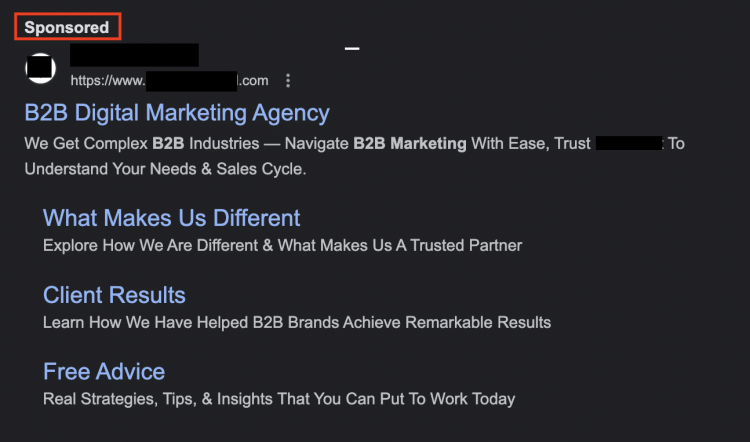SEO vs SEM: Should You Invest in Organic or Paid Search?
Estimated Read Time: 3 minutes
Intended Audience: B2B Marketers, B2B Business Owners, Microsoft Partners
As business owners and/or marketers, we’ve all pondered where we should invest our limited funds when it comes to search engine marketing. Do we spend all our money trying to rank #1 in organic search for our desired search terms in Google, Bing, Yahoo, etc.; or do we pay our way to #1 using paid advertising? If we rank #1 in paid advertising does that help our organic search rank for the same keyword(s)? Which is better for business in the short-term versus the long-term, investing in organic search or investing in paid search?
This battle between organic search and paid search is an ongoing debate in the digital marketing world. Although, it seems recently both the organic/natural search camp and the paid search camp are drawing more similarities and complements than differences.
First, let’s start with the differences:
How Organic Search and Paid Search Differ
What is Organic Search?
The primary difference between organic search and paid search is the cost. Organic search allows you to use content marketing and SEO tactics to rank for search engine results pages. It involves minimal to no cost, and rankings depend on the page speed, keywords, phrases, links, and topics discussed in your website and content. Search engines are constantly learning from users and updating their algorithms to reflect what users are most likely to click on. Nobody can tell you for sure what will help you rank first, but focusing on creating relevant, informational content with keywords used naturally and purposefully will help you rank higher.

What is Paid Search?
Unlike organic search, in which companies cannot pay search engines to show their results first, paid search does exactly that. Businesses can place bids on target keywords that they believe their content is most relevant for, and their ads can appear on the top of the page. Paid search usually follows a pay-per-click (PPC) model, meaning brands only pay search engines every time a user actually clicks on the ad. In other words, if your advertisement appears when a user searches for a keyword but they do not click on it, you will not incur any charges. This model reduces the likelihood of you having to pay for an advertisement shown to somebody you weren’t necessarily targeting.

The Benefits of Organic Search and Paid Search
Benefits of Organic Search
- No cost: Perhaps the most obvious benefit to organic search is the lack of financial investment required. Organic search rankings are driven by consistent, high-quality content. Creating relevant blog posts, infographics, ebooks, and white papers can help you rank higher in SERPs.
- Brand authority: When you create high-quality content for your visitors, you are establishing brand awareness and authority as a trusted leader in your industry. By demonstrating your value to potential customers, you increase the likelihood of them willing to give your products or services a chance.
- Long-term value: Content that you create as part of your content marketing strategy to rank higher in search engines can continue to drive visitors to your site long after you first publish it. This is why putting extra effort into creating evergreen content is essential, as it pays off over time.
Benefits of Paid Search
While it’s pretty difficult to beat the free-to-use structure of organic search, paid search comes with its own set of benefits, including:
- Immediate results: While organic search requires you to create relevant content and then wait weeks or even months for it to climb the ranks, paid search gives you immediate results. As soon as your ads go live, you can expect to start seeing a boost in visitors to your page.
- High intent: When a user searches for your keyword, they are likely considering making a purchase and likely to click the ad at the top of the search page. As we discussed above, with the PPC option, you only have to pay for users who actually click on your ad, and these are likely to be serious users.
- Various budget options: While paid search does require some financial investment, the good news is that you can create a custom budget and set a monthly ad spend across your paid search channels so you are not spending more than you intended.
Which Should You Choose?
Now that we’ve discussed the differences between organic and paid search, and the benefits of both, we can confidently tell you which one to invest in, and the answer is…it depends!
Some businesses may just be starting out and have no budget for marketing, in which case they might initially want to focus on organic search. Other businesses may have lots of competition, and as a result, might find it harder to ensure their content shows up on the first page. In this case, the paid search option might be the better choice, if the budget allows for it.
Whenever possible, businesses should aim to use organic search and paid search as a combined strategy. Since organic search is completely free, every business should be creating useful content to help them rank higher in search engines. Once a marketing strategy has been established, paid search campaigns can be used to complement overall marketing efforts. In fact, running paid ads helps with your organic search ranking as users are more likely to click on your page after seeing it in both places.
Let the Mavens Help You Devise Your Search Engine Marketing Strategy
We know you must be super busy with the day-to-day operations of your business and marketing may not be top-of-mind, but creating valuable evergreen content can help bring new visitors to your website months, and even years, after it goes live.
As a multi-award-winning B2B marketing agency, the Mavens have experience in all things SEM and SEO and can help you ensure you rank higher in search engines while helping you craft snappy ad campaigns that are guaranteed to increase your conversions.
Check out our blog for more insights into the world of B2B marketing. If you have any questions about your content marketing or paid ads strategy, feel free to reach out to us directly!




